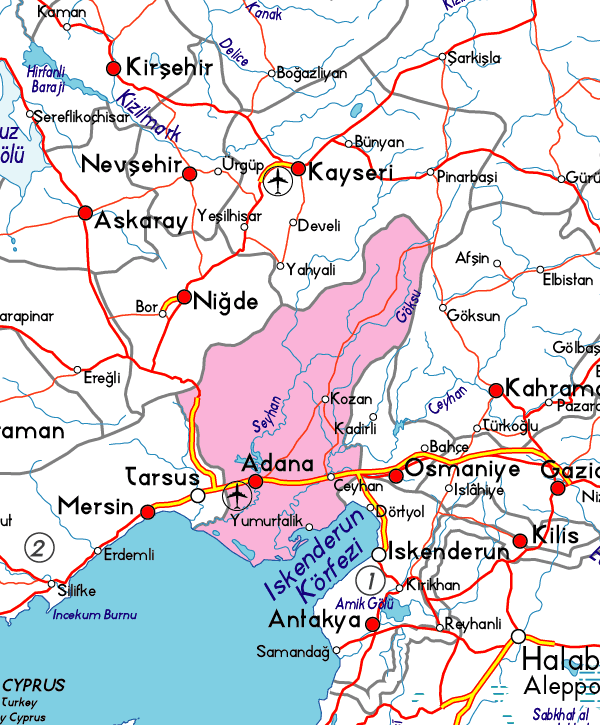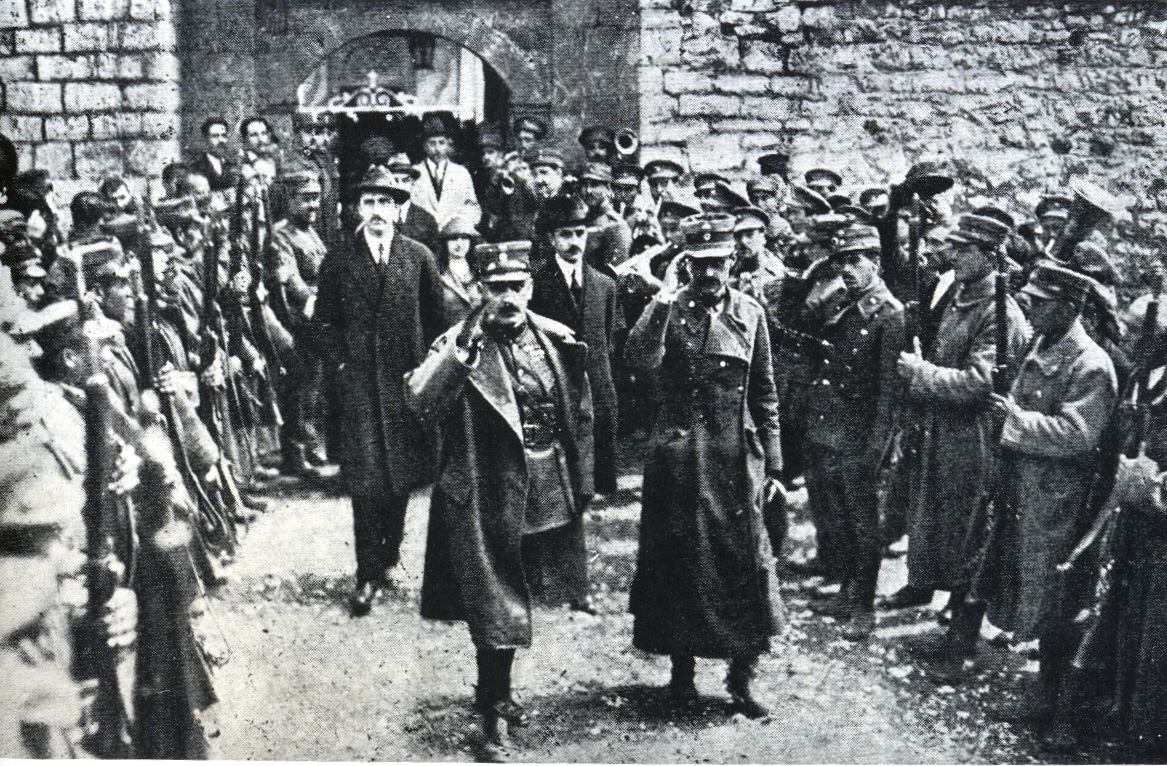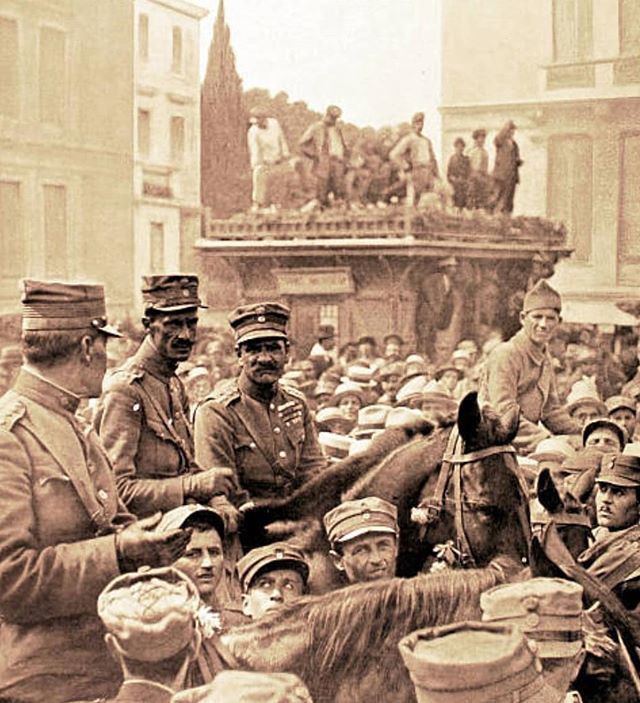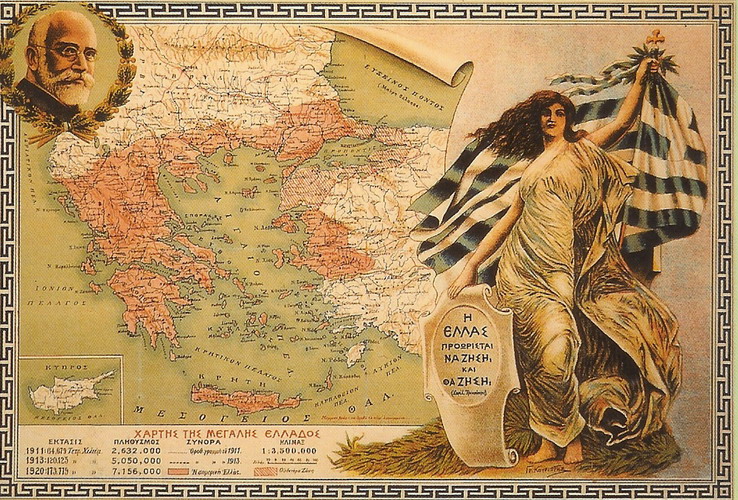//Ed. Note: Faik Kemal, an Edremit lawyer who was
imprisoned and tortured in Edremit before being sent to
Liosia prison camp in Athens, wrote a very detailed
account of his experiences - essentially, a unique
historical record of both Edremit's Greek occupation and
POW life at Liosia. Kemal's account is surpassed only
by that of Muzaffer the pharmacist, which will follow
in the coming days.//
 Greek troops arriving in Izmir on 5 May 1919.
Greek troops arriving in Izmir on 5 May 1919.
A Lawyer’s Noteworthy Revelations:
I was in the Liosia prison camp in Athens, Greece, from 8
September
1922 until 29 February 1923.
Prior to suffering in captivity, when the
soiled boots of the Greeks
brought filth to our pure homeland, I was
arrested in Edremit for the third
time on 13 April 1922 as part of a
definite plan against the intellectuals of
Edremit, filled with bloody
torture and seizure. I feel the need, with your permission, to
relate
some of these events.
It was exactly two years ago today, on Thursday, 13 April
1922, at
about three-thirty, Turkish time, when while I was in my office I
was
arrested by a Gendarmerie officer and brought to my home,
where there was a
team of 16 Gendarmerie soldiers under the
command of an officer. They made a very thorough seach, after
which
I was held for hours in the Gendarmerie post.
Next, I was
brought to a make-shift prison they had established in a
school,
located in the upper market area.
At the door was a sergeant and
his squad. The door was opened and I
was
put in as the jail’s first prisoner and in solitary confinement, as well.
Subsequently, Fehmi Bey, the director of Reji
(tobacco monopoly) was
brought in and put into another room. Contact between us was forbidden.
That night Karagözzade Ali Bey, a merchant,
was added, making three
of the former classrooms home to the three of us. The following day by
brother Abidin, who is
presently the Küçüktepe director, was brought in
and by the end of the week
there were 11 prisoners. Abiddin was put
into Karagözzade Ali Bey’s room and I shared a room with Fehmi Bey
but we were
still allowed only very limited contact, as our singular
captivity and
persecution continued with full ferocity.
Edremit is about 150 kilometers directly north of Izmir.
They accused me of collecting money and inciting the youth of the
sports
club, where I was the chairman, to rebellion and a massacre of
the Christians
on Easter. They characterized pharmacist
Muzaffer
Sürreya Bey as the ringleader of this committee and subjected him
to
torture for 38 days, along with Cevdet Bey, Midilli Hasan Efendi
and
Balıkesirli Necati Efendi. The level of
these inhumane atrocities
was extraordinary.
During this time, my solitary confinement continued
and my persecution
went on with full violence. They were
trying to
destroy the intellectuals of Edremit with false claims about what we
had bravely written and said.
Meanwhile,
my son-in-law İsmail Bey communicated the news of our
torture with the help of
secret couriers to Çanakkale and Istanbul,
redoubling efforts to make official
appeals on our behalf. In any event,
despite the horrific torture visited upon him, Muzaffer Bey, with the
fortitude
of a true Turk, did not deviate an inch from his resolve to keep
our affairs
secret. The other prisoners were
similarly tortured but did
not break, withholding any and all evidence and
signals about our work.
The
interrogations ended completely in the third month but our
confinement
continued and the prohibition on contact between us was
enforced in a vile and
vicious manner until the last moment of our
incarceration. This degradation inflicted on the spirit of
Edremit was
the work of a Greek supporter and Moslem currently in Athens named
Sirac Mehmed Bey, a person of bad character, together with others who
are no
doubt walking around right in front of our eyes, intent on
implementing this
definite program to annihilate Turkish intellectuals.
When our imprisonment ended in Edremit we
heard with great distress
and discouragement that they planned to send us to
Athens with the
connivance of the district chief of Hanya on Crete, who
arranged for
the appointment of Çerkes Vehbi Bey to be the district chief of
Edremit.
We were brought to Izmir on the
eve of the holiday for trial at the
general staff there, at the same time that
our army was bravely launching
its attack to reclaim the motherland.
The Greek "Big Idea".
We were in Izmir on 4-5-6 September, as the Greek authorities became
ever more
nervous about their own predicament. The
insults and death
threats hurled at us were indescribable. We were paraded through the
streets of Izmir
in handcuffs. Finally, on 6 September,
we were boarded
onto a Japanese ship and transported to Piraeus. On Friday, 8 September,
we went from Piraeus
to Athens, where we were kept in a monastery-
type building (Monastiraki Prison) for a few hours,
before being sent to
Liosia prisoner camp, and subjected to both death threats
and robbery.
The mugging inflicted on us
wasn’t seen even during the brigandage of
the Middle Ages. We were charged 50 francs each to hire a
vehicle to
take us to Liosia and of the 1,000 francs they collected, we saw with
our
own eyes that they put 950 francs in their own pockets. During our
seven months in captivity, we were
subjected to atrocities every hour of
every day and we saw our friends die from
the blows they received.
A Gendarmerie
cavalryman going to Athens along the road that passes
in front of our prison
turned his revolver on me but he instead wounded
Emin from Tekirdağ. A week later, a soldier on a train passing by
our
camp fired his gun at me. There was
this constant threat of death and
torture.
As for food, we were only able to sustain ourselves with the money our
families sent to us. In the course of my
entire captivity I never once put
a morsel of Greek food down my throat.
//END of PART XXVII-A//








